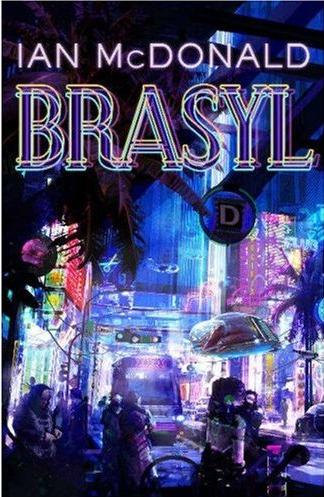
Ian McDonald’s Brasyl is his finest novel to date, and that’s really, really saying something. There are McDonald novels — Hearts, Hands and Voices, Desolation Road, Out on Blue Six that I must have read dozens of times, as you might watch Gene Kelly dance over and over, seeing it but never quite understanding how he does it.
Brasyl is a story in three braided pieces. The main action concerns Marcelina Hoffman, a coked-up ambitious reality TV producer in contemporary Brazil, a striving amateur martial artist who transcends the cliches of luvvy television phony and becomes a full-fledged, truly likable person as we watch her embark upon a mad new project. Marcelina is going to find the disgraced goalie who lost Brazil a momentous World Cup half a century before and trick him into appearing on television for a mock trial in which the scarred nation can final wreak its vengeance.
Another story is set in the mid-21st century, at a moment when the first quantum technologies are reaching the street, which industriously finds its own use for these things. Q-blades that undo the information that binds together the universe, Q-cores that break the crypto that powers the surveillance state that knows every movement of every person and object in Rio and beyond. McDonald’s future has that genuinely foreign feeling of a world recognizably our own but not our own. Remember how you felt the first time you read Neuromancer, the first time you saw Blade Runner, that feeling of a future that is all glittering promise and thunderous threat. There’s an entire literary movement lurking in the bootleg quantum future of McDonald’s Rio.
The final story is a 19th century Heart of Darkness adventure in the deep Amazon jungle, as we follow an Irish-Portuguese Jesuit into slaver territory where he is sent to end the mad, bloody kingdom of a rogue priest who scours the land with plague and fire. He is joined by a French natural philosopher, who intends to reach the equator and discover the shape of the world with a pendulum. The Frenchman is a heroic blade, as is the Irish priest, and in these sequences you’ll find swordfights that are the equal of anything in Fritz Leiber or the Princess Bride.
McDonald’s prose is like chili-spiced chocolate and rum — it reels drunken and mad through the book, filling your head to the sinuses, with rich complex tastes, until it seems that they’ll run out of your ears and eyeballs, until it feels like you’re sweating poetry.
He has the incredible gift of blending the foreign and the familiar to create something at once plausible and wonderful. He can turn anyplace from Ireland (King of Morning, Queen of Day) to India (River of Gods) into a bright, unknowably weird land. To see the world through McDonald’s eyes — a trip to Africa (Chaga) in the midst of alien “terraforming,” say — is to visit a place stranger and cooler than anything we might discover among the stars.
Brasyl masterfully braids its three timelines together into a master story that is both exciting and enlightening. I don’t think I’ve had as many a-ha! moments about the metaphysics of computation since reading Cryptonomicon. There isn’t a McDonald novel written that I haven’t loved, but this one, this one is special.
Pyr Books, the publisher, has posted the first 48 pages of the book, along with other sundry info. Try reading that intro and not getting hooked!
See also: Ian McDonald’s Kling Klang Klatch